One thing learned during the coronavirus pandemic was the effectiveness of soap and water — regularly washing our hands was our best defense. While dirty solar panels do benefit from a regular washing to ward off reduced output and efficiency, soap isn’t the answer here.
California-based solar installer and maintenance provider Bland Company never uses a cleaning agent on solar panels, instead relying on deionized water and a rotating-brush system to wash solar panels.
“Soaps can leave a film or residue that not only shades panels like the dirt that was just washed off, but it can also encourage dirt to stick and build up faster,” said Daniel Green, Bland marketing director. “We use deionized water that is applied through our rotating-brush system. This is the best way to leave the solar panels with a spot-free shine that’s as beautiful as the first day they were installed.”
Rather than risk Bland employee safety or potential damage to the solar panels they’re cleaning, the company has been using Sola-Tecs brush cleaners since 2018. A rolling brush is attached to wheels that glide across the solar panels, allowing for an almost-hands-free deep clean. Bland also runs the customer’s water through a demineralizing and ionizing system.
“[Sola-Tecs] is the only cleaning system we use. We’ve found that in combination with our water treatment procedure, it’s the best way to clean solar panels,” Green said. “It requires less water, fewer passes and no harsh chemicals or detergents.”
Premier Solar Cleaning (PSC) in Southern California also finds that using deionized water through water-fed poles and brushes works just fine to clean solar projects.
“If you have ever smelled your hands after washing them with soap, what you smell is the soap left behind, even though you cannot see any soap afterwards,” said Adam Fuller, co-founder of PSC. “If we used soap to clean panels, the very small molecules of soap would leave something behind for dust and dirt to build upon.”
PSC offers a full maintenance suite, including infrared inspections to find damaged panels that need more than just a good wash. Fuller also stays busy doing year-round “pigeon evictions,” cleaning underneath panels and installing critter guards to ward off birds and other animals. He takes pride in giving customers honest answers and showing how production will increase after panels are cleaned.
“The homes and factories nearest the airport and highways gather smog or oil-based pollution, which resist running off with a normal rainfall,” Fuller said. “These make some of the older blue panels appear black at first glance. Dirt on the surface reflects light away from the panels. A clean panel remains cooler, allowing the flow of electrons to move more easily.”
National residential and commercial O&M provider SunSystem Technology also stays away from soap and uses filtered water and a rotating brush to clean panels, but director of marketing Jeff Struhm said the company uses a mixture of diluted vinegar and hydrogen peroxide to aide in scrubbing away dirt and grime.
“When rain happens, soil accumulates at the bottom edge of the solar panel, obstructing the lower PV cell row and hindering the production efficiency,” Struhm said. “It’s like a car getting hosed down — you still need to scrub it or use a soil-releasing mixture in order to avoid scrubbing.”
Sometimes just water isn’t enough, but everyone agrees that soap should never be used. That’s why lubricant manufacturer Polywater released its Solar Panel Wash five years ago. The highly concentrated additive isn’t a filmy soap; instead it enhances water’s ability to clean solar panels, said Charlie Cole, Polywater international VP.
“We’re giving the water the capacity to lift the soil off the panel as opposed to a solvent, which is basically surrounding the dirt particle and taking it off the panel,” Cole said. “[Solar Panel Wash] is safer for the components of the panel. It’s not going to affect anti-reflective films; it’s not going to corrode the aluminum rails. It’s biodegradable, meaning that it’s non-persistent, making it friendly with the environment. It’s not going to affect the groundwater.”
Solar Panel Wash modifies the surface tension of the water, so instead of water beading up, it will form a continuous film across the solar panels to lift dirt and debris. Cole said Solar Panel Wash is especially helpful in arid locations where dust is high and water is scarce, because the wash allows for less water to be used in cleaning.
“A lot of these installations are done in desert regions where the availability of water is really an issue. If we can reduce the use of water, it’s an environmental benefit,” Cole said.
Polywater works with panel manufacturers to get its wash approved for use to not void any warranties. Canadian Solar and other global brands have confirmed Solar Panel Wash is safe for use on their panels. It can be purchased through Polywater’s global network of distributors and from Amazon in North America.
Solar O&M providers are glad the industry is waking up to the need for periodic panel washing.
“At the beginning, panel managers were saying, ‘Don’t use anything but rain water.’ People were taking that to heart, and then three years after the panel installation they started to see a significant degradation of productivity,” Cole said. “For a large installation, if your efficiency goes down by 50%, that really cuts into the economic justification that was made in the first place.”
Even on residential projects, homeowners will benefit from paying some extra attention to the cleanliness of their few solar panels.
“We oftentimes hear customers say that the rain does just fine cleaning their panels, and while the rain does wash some dirt off, it doesn’t truly clean the panels. If the panels are already filthy, the rain just makes it worse by converting dust to thick layers of mud,” Bland’s Green said. “The perfect analogy is to consider your car. If your car hasn’t been washed in six months, does leaving it out in the rain make the dirt better or worse? The same is true with dirty solar panels.”
Just don’t use soap — a little elbow grease and water work fine.

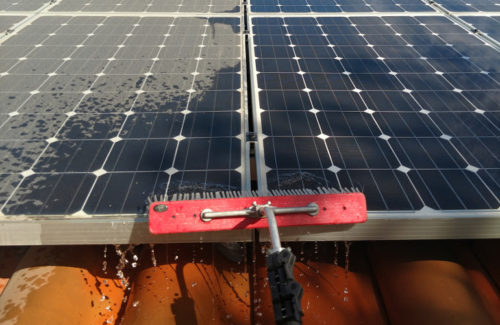
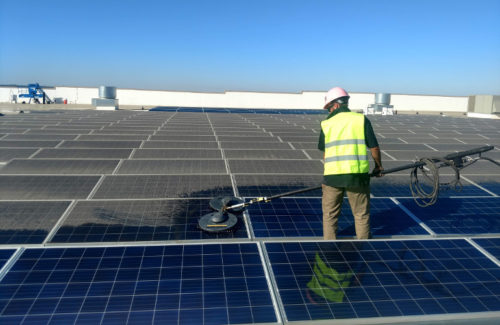
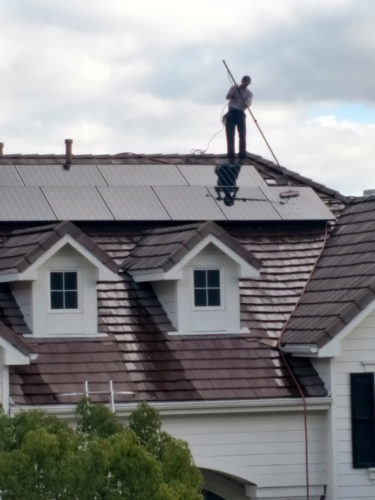
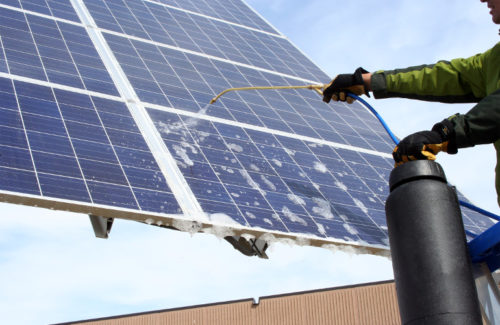
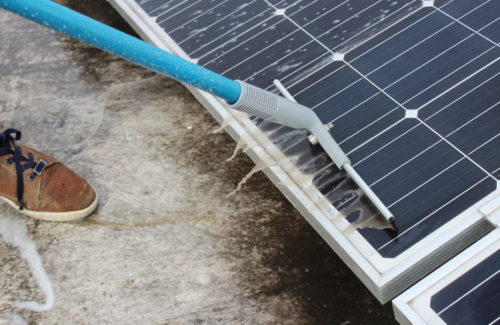
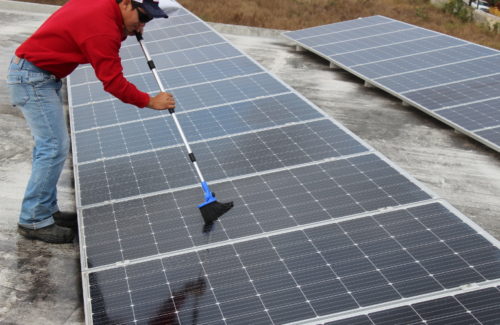

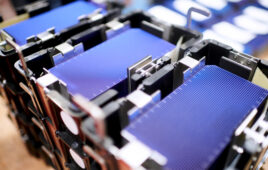


I highly recommend following the advice given in this article and avoiding the use of soap to clean dirty solar panels. Using soap or other harsh chemicals can damage the surface of the panels and reduce their efficiency over time.
Instead, it’s best to use a soft brush or cloth and plain water to gently remove any dirt or debris that may have accumulated on the panels. Regular cleaning of solar panel is essential to ensure optimal energy production, and this gentle approach will help to protect your investment and ensure maximum energy output for years to come.
I also advise contacting a professional solar panel cleaning company to ensure that the job is done safely and effectively, especially for hard-to-reach panels or larger installations. By taking proper care of your solar panels, you can enjoy the many benefits of clean, renewable energy for years to come.
Hello all,
My name is Randy with Tiki’s SoftWash located in the Inland Empire, Southern California. I own an exterior cleaning service and one service we offer is solar cleaning.
This is a great article and the information is absolutely educational. I’ve read a lot of your posts and many of you have questions and/or suggestions.
As a professional that has cleaned many solar panels I wanted to speak about what we’ve learned during our time cleaning. First, solar companies don’t speak about the maintenance because this can be an added cost or added personal task to your already busy schedule. Second, we’ve found that most solar companies though are knowledgeable about general info and installation are clueless when it comes to the maintenance of your solar panels. This truth has been realized time and time again in the industry.
There are several reasons one would hire a professional to clean. One of the most important reasons to hire a professional is the safety factor. Being on the roof can be very dangerous. Though some may be very comfortable with doing this task themselves doesn’t mean they have the experience to work in that environment. There are many factors to consider while cleaning on either a one story or two story home.
Two, many houses in Southern California have tiled roofing materials. If you are not experienced in walking on this type of material you can cause a lot of damage to your roof. I have witnessed much damage from homeowners trying to walk on there own roof for various reasons.
Three, we have all the right equipment. Our truck carries 300 feet of hose and utilizes a soft rinse and a soft bristle hand brush with extension handles that reach 30 feet for small jobs and a rotating soft bristle brush for large jobs. We clean with water only and rinse with deionized water for a streak free shine.
And last, BEWARE, most solar companies claim that if customer uses any soap or cleaning products or third party companies hired that use soaps or cleaning products, that this can affect the warranty. Definitely check with your solar professional before applying any cleaning products to your solar panels. Using DI water is the safest alternative to keeping your panels clean.
If you would like to ask questions or make an appointment please go to our website at: http://www.tikisSoftWash.com
Or call: (909) 375-0408
very clear and good article easy to understand. Thank you
Do I need shut power off before clean up solar panel?
seems like a lot of water is being wasted especially in arid regions. how about electrostatic?
I live in the beautiful Central Valley in California. Since it is primarily an agricultural area, dust in the air is common, and will build up on solar panels. This layer of dirt will reduce the amount of energy the solar panels produce. I did a little research as to how the solar panels actually work and what wavelength of light solar panels use to generate electricity. I found that the solar panels use the visible wavelengths. Knowing that UV light destroys everything, especially in California, I wanted a way to block the UV light, and clean my solar panels so the visible wavelength is an obstructed. My conclusion was to use the same soap that I use to wash my car. McGuiar’s wash and wax. https://www.meguiars.com/automotive/products/meguiars-ultimate-wash-wax-g17748-48-oz-liquid This car wash soap is gentle enough to clean the fragile paint on our cars, and contains wax, which will naturally be depleted by the UV rays from the Sun. I also use a car wash pass through Pole and brush that I got from Harbor Freight. https://www.harborfreight.com/instant-on-off-telescoping-flow-thru-brush-67658.html Each time I have washed my solar panels, I have gotten between 7% and 12% increase in production the following day. At dusk, after the panels have cooled down, I spray them wet with water, then using a spray bottle with a quarter ounce of the car wash soap and 32 oz of water, I spray a section of panels at a time. I gently brush the panels, then I turn the water on and brush the panels again rinsing them off at the same time. I do not squeegee them dry. My panels are the cleanest on the block!
Thanks for heads up in research. I live by Fresno. How long does the car wash last? I was using dawn dish soap and it would hold up for about a month or so before needing to be cleaned again.
I installed 27 panels back in 2020 and clueless on how to clean them after all the months.
Being a car fanatic and only taking absolute care for the paint, I figured using the same method on my panels would do no harm.
I mean if a wash mitt can’t or won’t swirl the paint, how can it do any harm to the panel right?
I was very unsure on using meguiars but your post just gave me some relief, so thank you.
Panels can last for many years using this method. I have noticed that some bugs like to lay their egg cases on solar PV panels, these leave a waxy blob on the panel that is not always easy to remove. In those cases, warm soapy water, squeegee with a soft rubber blade, repeat until gone.
can you use polish to put on you solar panel to reflect water
No
Has anyone tried that product called “ Wet n Forget”. Simply because I’m terrified of getting on my roof because of the slope. With this stuff I use it to clean the siding on my house. So I was just asking
It is pretty amazing how most solar panel cleaning services do not realize this. Down in Albuquerque, we mostly have window washing companies offer solar panel cleaning as a service and they have no access to de-ionized water. They wash the solar panels just like they’d wash any other window. We do it the right way though. Check out our work at https://www.solarpanelcleaningalbuquerque.com
One thing that is not mentioned here is TEMPERATURE.
I live in the desert where the temp. is anywhere between 115 and 130 degrees all days of summer. Yes, it is hot!
This (temperature) of the panels is one of the most important things to be aware of.
The panels get hot so throwing cool water on them could easily cause the glass to crack! Not good.
The ideal time to clean them would be early morning before they even have a chance to heat up. Other than that would be evening after they have had a chance to cool down.
Just saying.
Great article! Solar panels don’t need a lot of aftercare but keeping them clean is a must, avoid using products such as Windex and never use a pressure washer to clean them! As other comments have mentioned bird dropping aren’t so easy to remove!
Address safety / shock factor.
I have just installed solar panels at my house and I was not sure how to clean that because if it leave water spots it might harm the panels. But I just got what I was looking for, and thank you for sharing such informative article with us.
We have a very thick layer of soot on our solar panels. It is so thick I can write in it. (We’ve had multiple fires very close to our property in the past two months). Water and a brush do NOT get the soot off. I am thinking of using Dawn dish soap mixed with water and a soft bristle brush. Dawn is really good at cutting greasy substances. However, I also understand it can leave streaks but streaks can not be as bad as leaving the soot, can it? When washing windows the best recipe is 2 or 3 drops of dawn per gallon; I was thinking of doing the same for the panels. Please let me know your thoughts at your earliest convenience.
Thank you,
Pam
Your Homeowners Insurance should cover cleaning them if due to wildfires. I even had ash in the water basin of my coffee pot from the ‘07 WitchCreek Fire in CA. Even though my place didn’t burn, my HO policy covered and entire cleaning inside and out. Since the fires are a natural disaster your rates don’t increase.
You can also get a reasonably priced water deionized from Unger on Amazon. Its the blue model for washing cars. I use it for my panels, works great. Little bit of dawn on a rv brush and a long pole then rinse with the filtered water. Good to go.
HA VE NOT HEARD ANYONE TALK ABOUT PRODUCTS THAT WON’T LEAVE WATER SPOTS WHICH IS BAD FOR PANELS, ANYONE HAVE A GOOD IDEA ON A PRODUCT THAT WOULD WORK
Mixed vinegar and water. Splash you car down with it after washing then leave it in the sun to dry. You won’t have any spots.
Yes that’s a system call RO/DI water systems gives you 100% purify water and thats the only way not to get water marks on your panels and windows i used all the time. The best results but is very expensive to buy! I have a clean business
Check my facebook page i have couple pictures there
SUN SOFT WASH
http://www.sunsoftwash.com
Hope that helps you
We wash our panels with a mixture of water and Dawn soap with a final clean water rinse. We do this once a year after all the pollen has finished falling. Our problem is with stained roof shingles from between the two solar panels (facing south). We have had the roof “soft washed” with no real success.
Someone suggested installing a zinc panel below the solar panels. Does anyone out there have an answer? Thank you
My panels have a cloudy surface that does not wash of. Any ideas. 4. Year old panels
As mentioned in the article, ““When rain happens, soil accumulates at the bottom edge of the solar panel, obstructing the lower PV cell row and hindering the production efficiency…”
This is because the Al frame is higher than the glass, thus prevents the soil water flowing out of the module surface.
As Ramond Davidalso mentions, “Depends on the tilt of the modules as well. Panels at 30 degrees get cleaner with rain water better that 10 degrees tilt or less…”
This is because the low-angle installed rooftop solar module is much easier to accumelate dust nearby the frame edge. Normally for the angle lower than 15 degree, water cannot flow out of the module surface due to the Al frame (like a dam).
So there is a solution to add a small component onto the frame, which can help the accumulated soil water acrosss the frame and flow out of the module surface automatically during the rain, thoroughly remove the dust nearby the frame, also help remove the carbon-hydrogen contamination.
This is a patent technology, has been sucessfully applied on tile roof top solar installation, of which the installation agle is always lower than 15 degree. If you wang to know more, testpv.com
I read the full technical document of a component so called ” Mud killer”,which describes the detail on how to remove the dust from the near-frame glass surface. Find the detail here:
http://www.testpv.com/portal.php?mod=view&aid=25408
The need and effectiveness of solar panel cleaning is affected by many factors. The types of soiling, levels of rainfall, size of installation, cleaning methods and mineral content of water used to wash panels can affect the level of efficiency gains from cleaning. For those installations where frequent panel cleaning is required, an assessment must be made of cleaning processes and equipment and whether a chemical cleaning solution is required.
If it is determined that a PV cleaning product is required, its panel component compatibility needs to be considered. Glass cleaning products and dish soaps are often used to clean PV panels. They can contain a wide array of solvents and their frequent use can corrode or weaken metal and water-proofing components surrounding the panel’s protective glass to expose underlying solar cells to the risk of damage. Solvents can also damage panels’ anti-reflective films to reduce power generating efficiency. Solvents like ethanol are flammable and Volatile Organic Compounds (VOC). Polywater’s SPW is a non-solvent cleaner that eliminates these risks of component damage. Approved by major solar panel manufacturers, SPW is designed to be a safe and effective PV panel cleaner.
Actually the worst case that affect the power generation is the dust accumalated around the solar panel frame, which contributes almost 80% of power loss. 20% efforts of dust cleaning for frame-side dust causes 80% power gain, in another word, 80% efforts of dust cleaning for the glass surface only get 20% of power gain.
By using the “mud-killer”, all dust around the solar panel frame will disappear thoroughly. So it helps gain the 80% of power loss back. You may need not spend additional product cleaning any more.
From the product document and field test, we confirmed the above mentioned.
Please read and download the following article(it’s english version):
http://www.testpv.com/portal.php?mod=view&aid=25408
The importance of good after care cannot be overemphasized. Great article.
Very well put together post! We need more people spreading the word about not using harsh chemicals on solar panels because they really can be harmful and can damage the panels.
Many chemicals can be abrasive and can scratch the surface of the panels, which can reduce their effectiveness. Additionally, some chemicals can react with the materials used in solar panels, such as the photovoltaic cells, and can cause permanent damage. We’ve done so many solar panel replacements solar panel replacements due to this problem. It is generally best to use a cleaning solution that is specifically designed for solar panels and to avoid using abrasive materials or harsh chemicals.
When I was about 30 years old, I had made friends with a retired UPS supervisor, & his brother, in a fast growing town in central Kentucky, (this was back around 1980, just before the Chicago Bears got on a roll for the 1985 Superbowl, … they owned a carwash/full service gas station, with a oil change bay, … they were quite energetic, in coming up with ways to provide a number of services for the community, …
The one thing I remember JS, saying about that business, is that soap, does not clean cars, … and he showed me a barrel that provided the customers “seller”, … You see, the customers love to see suds, & believe that it is the soap which is cleaning their vehicle, … And JS, acknowledged that the soap only helps in providing a medium to carry the dirt away from the vehicle, … The real “magic behind the curtain” was sitting just to the side of it, & in a dry corner of the contents room sat several bags of water softener salt, … packed up 6 high on pallets, & covered with plastic so it did not get wet too early, … just in case a water leak sprang from somewhere amongst the equipment, …
Soft water was the key to cleaning, & hot “soft” water would degunk just about anything you could find on any automotive vehicles, … from heavy trucks that worked the coal mines, to old grannies, that only use the car on Sunday, to go to church, to the ingle guys who would “cruise” the malls, … there was a lot of traffic that got washed at the self-service/full service car wash, you could buy a carwash, fill up your car, get the oil changed, & I’d be there if you wanted to get your car waxed, … or to have the luster restored to the paint, then waxed, … I was too cheap, for the prices I was charging, but made enough to feed my family, barely, … but that is another story, … lol, … lets just say that I learned how to have, & keep a nice ride without a lot of expense, & very little upkeep, …
Airborne Hydrocarbons like to stick to glass, paint & metal and, much to the surprise of researchers, who were investigating the Lotus Effect of extreme hydrophobicity; Hydrocarbons also like surfaces that have been treated to shed water or are in some manner modified to be self cleaning. TiO2 coating may be an exception but they may interfere with photon transmission. The hydrocarbon build up attracts airborne particles.
Where I work in the SF Bay area, I’m sandwiched between 10 lanes of I-880 and one of the main off ramps to Tesla. Suffice to say, my car gets dirty. On occasion, I have noticed that a gentle but persistent rain, unaccompanied by wind and thus rapid evaporation, practically leaves my car and the windshield, streak free. My car is 20 years old, the paint has signs of bossing from the car wash and yet a gentle, persistent rain leaves it pristine.
I measured before and after cleaning my panels at the end of a dry summer in Portland and found 1% or less output increase only. Very dusty locations probably more.
Seven years after installing PV on my Chandler, AZ home, I have concluded that cleaning PV modules is unnecessary. After a full year of operation I cleaned my modules and compared before and after kWh production. The day before cleaning and the day after were identical cloudless days at the exact same temperature. I discovered there was absolutely no change in kWh performance. While cleaning modules may be worthwhile in heavy bird dropping area or Fresno with heavy soiling from agricultural activity, in my firm opinion, it does not pay to do this in the vast majority of residential PV applications.
Car windscreen cleaner solution would seem to fit the task. It removes road film, bird effluvia and squashed bugs…..
Use SWP Solar Wash Protect a concentrate Bio degradable solution mixed with water for better wash for long period. It is dust repellent cleaning solution for Solar Panels only.
Depends on the tilt of the modules as well. Panels at 30 degrees get cleaner with rain water better that 10 degrees tilt or less
You won’t get bird droppings off without detergent.
Getting it soaked with ordinary water (without soap) for a few minutes before washing is sufficient to remove it.
Rainx……..works for me ..about 10 years now
Unless you have lots of birds flying over the panels lol
I tried Rainx it works fine with rain, but in the winter snow tends to hang up more than on plain panels.
I don’t use soap because I drink the water off my roof.
Must taste pretty good I’d say…you’re drinking everything else that LEACHES off your roofing materials.
I would have to imagine that he runs it through some kind of filter, most people don’t drink rainwater directly
Hopefully you are using a sand filter followed by an activated charcoal filter.
This article seems to be using the word “soap” rather broadly. Of course you aren’t going to rub your panels with a bar of Dial soap! Detergents and surfactants are another story. They really help to remove surface contaminants, rinse easily, and don’t leave a sticky film. You need to avoid consumer products that have other junk in them like skin softeners, and the final rinse should be D.I. water. D.I. water by itself is fine, but sometimes an oily contaminant needs more.
The best way to clean solar panels is with rotating brushes or robots that have rotating brushes mounted on them. In our extensive cleaning experience (our machines have cleaned 100s of GW) soap is not necessary, just de-ionized water!
I’ve had my 5KWh system for about 6yrs now and I’ve been keeping a detailed log on its energy production, I’ve never had a service done and never had anyone wash the panels, I let the rain clean the panels and to this day it’s producing the same it was when installed, when I say same I mean no great reduction in power, very happy with mine.
May I ask what the panels look like, though. Mine are quite grimy with algae.
Relay soap is not recommended I as an instullar prefers a brush and water,and a soft tawel.
Long ago, when Sanyo made the HIT solar PV panels, their product sheet called out “cheap” dish washing liquid, not the stuff with skin softening aloe Vera or something like that. Warm water dish soap and a (towel) to wash down the panels. First step was spray down all the panels and let the water drain, second step wash down panels with dish soap, then spray off and squeegee with a soft rubber blade. I’d say most solar PV manufacturers will absolutely say not to use harsh chemicals like Windex or cleaners with any kind of cleaning “grit”. Panels can last for many years using this method. I have noticed that some bugs like to lay their egg cases on solar PV panels, these leave a waxy blob on the panel that is not always easy to remove. In those cases, warm soapy water, squeegee with a soft rubber blade, repeat until gone.